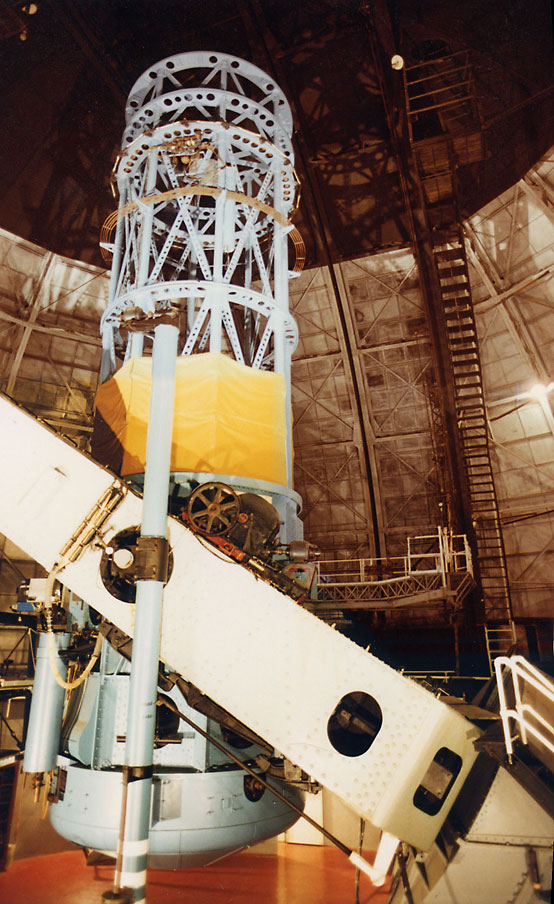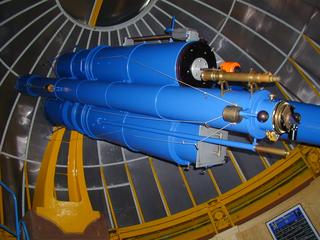|
Karl Wilhelm Valentiner
Karl Wilhelm Valentiner (22 February 1845 in Eckernförde – 1 April 1931) was a German astronomer. Life In 1874, Wilhelm Valentiner led a successful German expedition to Zhifu ( China) to observe a solar eclipse. 1875, He took over the directorship of the Mannheim Observatory in 1875. Since the observing conditions in the Mannheim city centre were deteriorating, Grand Duke Frederick I of Baden approved Valentiner's request to relocate the observatory in Karlsruhe in 1880. The telescope, however, was located in a makeshift hut in Karlsruhe Nymphenburg Park. Much to the annoyance of Valentiner, now appointed Professor of the University of Karlsruhe, no new observatory was built. He decided to apply for a position at Königstuhl near Heidelberg. After the establishment of the "Grand Duchy Mountain Observatory" (today's Heidelberg-Königstuhl State Observatory Heidelberg-Königstuhl State Observatory (german: Landessternwarte Heidelberg-Königstuhl) is a historic astronom ... [...More Info...] [...Related Items...] OR: [Wikipedia] [Google] [Baidu] |
Eckernförde
Eckernförde ( da, Egernførde, sometimes also , nds, Eckernför, sometimes also ) () is a German town in Schleswig-Holstein, Rendsburg-Eckernförde, on the coast of the Baltic Sea approximately 30 km north-west of Kiel. The population is about 23,000. Eckernförde is a popular tourist destination in northern Germany. Name The name of Eckernförde is of mixed origin, but derived from the name of a Danish castle formerly located near the current town, which is also reflected in the name of the town district of ''Borby.'' This fortification is listed in the 13th century Liber Census Daniæ as ''Ykærnæburgh.''Politikens Nudansk Ordbog, 1994 edition, entry "Eckernförde" In 1441, the town used an official seal listing its name as ''Eherneborgh''.Poul Bredo Grandjean (1953), ''Slesvigske Købstæders og Herreders Segl indtil 1660'', J.H. Schultz Forlag, p. 13-14. The first syllable corresponds to the modern Danish word "egern" meaning ''squirrel'' while "-förde" is Low Germ ... [...More Info...] [...Related Items...] OR: [Wikipedia] [Google] [Baidu] |
Telescope
A telescope is a device used to observe distant objects by their emission, absorption, or reflection of electromagnetic radiation. Originally meaning only an optical instrument using lenses, curved mirrors, or a combination of both to observe distant objects, the word ''telescope'' now refers to a wide range of instruments capable of detecting different regions of the electromagnetic spectrum, and in some cases other types of detectors. The first known practical telescopes were refracting telescopes with glass lenses and were invented in the Netherlands at the beginning of the 17th century. They were used for both terrestrial applications and astronomy. The reflecting telescope, which uses mirrors to collect and focus light, was invented within a few decades of the first refracting telescope. In the 20th century, many new types of telescopes were invented, including radio telescopes in the 1930s and infrared telescopes in the 1960s. Etymology The word ''telescope'' was coin ... [...More Info...] [...Related Items...] OR: [Wikipedia] [Google] [Baidu] |
People From Eckernförde
A person ( : people) is a being that has certain capacities or attributes such as reason, morality, consciousness or self-consciousness, and being a part of a culturally established form of social relations such as kinship, ownership of property, or legal responsibility. The defining features of personhood and, consequently, what makes a person count as a person, differ widely among cultures and contexts. In addition to the question of personhood, of what makes a being count as a person to begin with, there are further questions about personal identity and self: both about what makes any particular person that particular person instead of another, and about what makes a person at one time the same person as they were or will be at another time despite any intervening changes. The plural form "people" is often used to refer to an entire nation or ethnic group (as in "a people"), and this was the original meaning of the word; it subsequently acquired its use as a plural form of ... [...More Info...] [...Related Items...] OR: [Wikipedia] [Google] [Baidu] |
1931 Deaths
Events January * January 2 – South Dakota native Ernest Lawrence invents the cyclotron, used to accelerate particles to study nuclear physics. * January 4 – German pilot Elly Beinhorn begins her flight to Africa. * January 22 – Sir Isaac Isaacs is sworn in as the first Australian-born Governor-General of Australia. * January 25 – Mohandas Gandhi is again released from imprisonment in India. * January 27 – Pierre Laval forms a government in France. February * February 4 – Soviet leader Joseph Stalin gives a speech calling for rapid industrialization, arguing that only strong industrialized countries will win wars, while "weak" nations are "beaten". Stalin states: "We are fifty or a hundred years behind the advanced countries. We must make good this distance in ten years. Either we do it, or they will crush us." The first five-year plan in the Soviet Union is intensified, for the industrialization and collectivization of agriculture. * February 10 – O ... [...More Info...] [...Related Items...] OR: [Wikipedia] [Google] [Baidu] |
1845 Births
Events January–March * January 10 – Elizabeth Barrett receives a love letter from the younger poet Robert Browning; on May 20, they meet for the first time in London. She begins writing her ''Sonnets from the Portuguese''. * January 23 – The United States Congress establishes a uniform date for federal elections, which will henceforth be held on the first Tuesday after the first Monday in November. * January 29 – ''The Raven'' by Edgar Allan Poe is published for the first time, in the '' New York Evening Mirror''. * February 1 – Anson Jones, President of the Republic of Texas, signs the charter officially creating Baylor University (the oldest university in the State of Texas operating under its original name). * February 7 – In the British Museum, a drunken visitor smashes the Portland Vase, which takes months to repair. * February 28 – The United States Congress approves the annexation of Texas. * March 1 – President John Tyler signs a bill authorizing ... [...More Info...] [...Related Items...] OR: [Wikipedia] [Google] [Baidu] |
Max Wolf
Maximilian Franz Joseph Cornelius Wolf (21 June 1863 – 3 October 1932) was a German astronomer and a pioneer in the field of astrophotography. He was the chairman of astronomy at the University of Heidelberg and director of the Heidelberg-Königstuhl State Observatory from 1902 until his death in 1932. Early life Max Wolf was born in Heidelberg, Germany on 21 June 1863, the son of medical doctor Franz Wolf. His father encouraged an interest in science and built an observatory for his son in the garden of the family home. It is from here that Wolf was credited with his first astronomical discovery, comet 14P/Wolf, in 1884. Life at the university Wolf attended his local university and, in 1888, at the age of 25, was awarded a Ph.D. by the University of Heidelberg. He spent one year of post-graduate study in Stockholm, the only significant time he would spend outside of Heidelberg in his life. He returned to the University of Heidelberg and accepted the position of ''pri ... [...More Info...] [...Related Items...] OR: [Wikipedia] [Google] [Baidu] |
Astrophysics
Astrophysics is a science that employs the methods and principles of physics and chemistry in the study of astronomical objects and phenomena. As one of the founders of the discipline said, Astrophysics "seeks to ascertain the nature of the heavenly bodies, rather than their positions or motions in space–''what'' they are, rather than ''where'' they are." Among the subjects studied are the Sun, other stars, galaxies, extrasolar planets, the interstellar medium and the cosmic microwave background. Emissions from these objects are examined across all parts of the electromagnetic spectrum, and the properties examined include luminosity, density, temperature, and chemical composition. Because astrophysics is a very broad subject, ''astrophysicists'' apply concepts and methods from many disciplines of physics, including classical mechanics, electromagnetism, statistical mechanics, thermodynamics, quantum mechanics, relativity, nuclear and particle physics, and atomic and m ... [...More Info...] [...Related Items...] OR: [Wikipedia] [Google] [Baidu] |
Astrometry
Astrometry is a branch of astronomy that involves precise measurements of the positions and movements of stars and other celestial bodies. It provides the kinematics and physical origin of the Solar System and this galaxy, the Milky Way. History The history of astrometry is linked to the history of star catalogues, which gave astronomers reference points for objects in the sky so they could track their movements. This can be dated back to Hipparchus, who around 190 BC used the catalogue of his predecessors Timocharis and Aristillus to discover Earth's precession. In doing so, he also developed the brightness scale still in use today. Hipparchus compiled a catalogue with at least 850 stars and their positions. Hipparchus's successor, Ptolemy, included a catalogue of 1,022 stars in his work the '' Almagest'', giving their location, coordinates, and brightness. In the 10th century, Abd al-Rahman al-Sufi carried out observations on the stars and described their positions, ma ... [...More Info...] [...Related Items...] OR: [Wikipedia] [Google] [Baidu] |
Heidelberg
Heidelberg (; Palatine German language, Palatine German: ''Heidlberg'') is a city in the States of Germany, German state of Baden-Württemberg, situated on the river Neckar in south-west Germany. As of the 2016 census, its population was 159,914, of which roughly a quarter consisted of students. Located about south of Frankfurt, Heidelberg is the List of cities in Baden-Württemberg by population, fifth-largest city in Baden-Württemberg. Heidelberg is part of the densely populated Rhine-Neckar, Rhine-Neckar Metropolitan Region. Heidelberg University, founded in 1386, is Germany's oldest and one of Europe's most reputable universities. Heidelberg is a Science, scientific hub in Germany and home to several internationally renowned #Research, research facilities adjacent to its university, including the European Molecular Biology Laboratory and four Max Planck Society, Max Planck Institutes. The city has also been a hub for the arts, especially literature, throughout the centurie ... [...More Info...] [...Related Items...] OR: [Wikipedia] [Google] [Baidu] |
Königstuhl (Odenwald)
The Königstuhl (), is a high hill in the Odenwald Mountains and in the city of Heidelberg, in the German state of Baden-Württemberg. The Königstuhl summit allows visitors views of the city of Heidelberg and the Neckar river. On days with good conditions the view extends to the Pfaelzerwald (Palatinate Forest), which is roughly 40–50 km away. The hill is linked to Altstadt, by the Heidelberger Bergbahn, a two section historic funicular railway that stops at Heidelberg Castle, located on the lower slopes of the Königstuhl, the Molkenkur restaurant/hotel, and the ultimate stop at the mountain top which host a restaurant, an entertainment park for kids and various walking paths. The Max Planck Institute for Astronomy is located near the summit of the Königstuhl, as is the historic Landessternwarte Heidelberg-Königstuhl astronomical observatory, established in 1898. Between 1912 and 1957, Karl Wilhelm Reinmuth discovered almost 400 asteroids whilst working from this ... [...More Info...] [...Related Items...] OR: [Wikipedia] [Google] [Baidu] |
University Of Karlsruhe
The Karlsruhe Institute of Technology (KIT; german: Karlsruher Institut für Technologie) is a public research university in Karlsruhe, Germany. The institute is a national research center of the Helmholtz Association. KIT was created in 2009 when the University of Karlsruhe (), founded in 1825 as a public research university and also known as the "Fridericiana", merged with the Karlsruhe Research Center (), which had originally been established in 1956 as a national nuclear research center (, or KfK). KIT is a member of the TU9, an incorporated society of the largest and most notable German institutes of technology.TU9 As part of the German Universities Excellence Initiative KIT was one of three universities which were awarded excellence status in 2006. In the following "German Excellence Strategy" KIT was awarded as one of eleven "Excellence Universities" in 2019. KIT is among the leading technical universities in Germany and Europe. According to different bibliometric ranking ... [...More Info...] [...Related Items...] OR: [Wikipedia] [Google] [Baidu] |


_1938.jpg)




